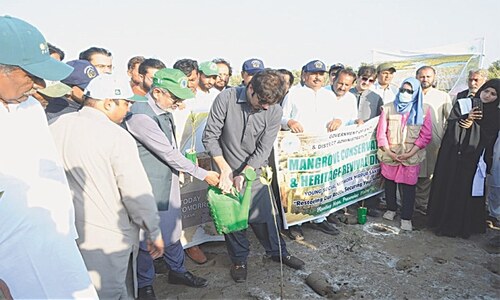KARACHI: Iranian-American scholar of religious history Dr Reza Aslan delivered an engaging talk titled ‘Why do we believe?’ at Habib University on Thursday evening.
Dr Aslan first enlightened the audience, which had packed the university’s H.M. Habib auditorium like sardines, about the many myths that exist about the act of creation in the history of mankind, including ancient Egyptian and Mesopotamian myths. What most of these myths had in common was the belief that human beings were created by the gods in their image, whether to serve or love them.
“Faith is an experiential phenomenon, not a rational one. It is fundamentally an emotion like love, you either love someone or you don’t. No one can convince you to love someone. The same is true of faith. You need to believe that there’s something beyond the material realm or you don’t… Faith and religion are not the same thing. Faith is individualistic, mysterious and ineffable. It is embedded in the brain. It is fundamentally a part of what it means to be human, to strive for transcendence. Religion is nothing more or less than the language that we use to express faith. It is an institutionalised language made up of symbols and metaphors to express which is inexpressible –– the experience of transcendence.”
Acclaimed Iranian-American scholar Dr Reza Aslan speaks on religion, faith and devotion
Dr Aslan said throughout the history of religions there has been one symbol that has stood out as supreme, one metaphor: that metaphor is us, human beings. The entire history of spirituality can be interpreted as a cohesive attempt to make sense of God.
Dr Aslan said the propensity to religious belief is inherent to our species. There is no disagreement among theologians and scientists on it. Religious impulse is so widespread that it must be considered an elemental part of human experience. If religious belief predates the existence of homo sapiens then there must be some adaptive advantage to it. There are different views on it, such as religious belief exists to answer some unanswered questions or to alleviate discontent or give humans a sense of social cohesion. But Dr Aslan found points of debate in all these reasons.
Then the scholar returned to the question, why do we believe? And answered: maybe we are just made this way. Maybe we are meant to be believing creatures… we are homo-religiosus in our existential striving towards transcendence. Studies have shown that children are born with an instinctual propensity for substance dualism, that body and soul are distinct in form and nature. This means we enter the world with an innate sense that we are more than just our physical bodies. There is more than just the material realm. Perhaps the origin in religious beliefs is not in our quest for meaning, but it is the very facet of the complex workings of our brain.
Dr Aslan said whether one subscribes to these ideas or not, one fact cannot be ignored that religion and belief are first and foremost a neurological phenomenon, whatever its purpose may be.
After the talk, the scholar sat down for a question and answer session. The event was part of Habib University’s Yohsin Lecture series.
Published in Dawn, June 14th, 2019


































